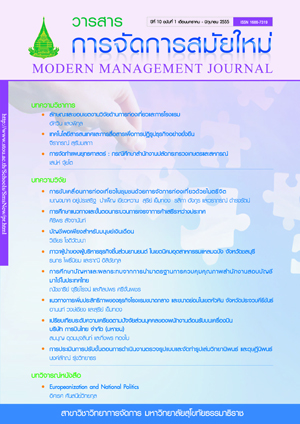COMMUNITY TOURISM DRIVEN BY HOSPITALITY MANAGEMENT
Keywords:
Hospitality Management, Community Tourism, Community ParticipationAbstract
ABSTRACT
This study was a qualitative research focusing on participatory action research. The purposes of this research were to generally study and analyze the tourism situation in the communities; to find guidelines for supporting the participation in local sustainable tourism development of the people in the communities; to create tourism knowledge management process in order to make them perceive and understand the principle and guidelines for community based tourism management; and to be a good host adhering to the standard of servicing in 7 aspects, these were personnel aspect, home-stay aspect, servicing aspect, security aspect, food & beverage aspect, souvenir aspect, and security aspect which led to sustainable income for them. The sample used in this study was selected by purposive sampling method, was a community or village that provides the home-stay accommodation for tourism community. From this basis, three main community areas were involved in the study: 1) Bann Rim Klong, Ban ProkSub District, Muang District, Samutsongkram Province; 2) Tadan Community, Hintang Sub District, Muang District, Nakhonnayok Province; and 3) Bann Busai, Busai Sub District, WangnamKeow District,Nakhon Ratchasima Province. For this study, the research was conducted in four stages: 1) to study background and overview of the tourism community management in each community; 2) to prepare an approach of tourism management by the community and being a good host; 3) to create the process of community tourism knowledge management by sharing together with knowledge, skills, and experiences; and 4) to evaluate of each community’s knowledge in terms of the tourism community development by hospitality management. The research data were collected by observations, in-depth interviews, focus groups, workshop, and field survey, and then were analysed by a descriptive analysis method.
The results showed that the need for tourism community development by the hospitality management of three communities were a much different in the context of each location. However, it was found that all communities had a change in the process of the community tourism knowledge management by hospitality management of four issues as follow details. 1) Communities applied the knowledge of management to improve and develop community tourism. 2) Most of people in the community adopted the service quality standard based on the hospitality management guideline in order to enhance their community tourism services. 3) The rise of public-private network formation was developed for effectiveness of driving the community tourism management. 4) The community members had been involved in their community activities particular in the planning, implementation, and evaluation processes. Recommendation of the study, driving the community tourism by hospitality management should be a continuous process, which members could participate in all stages of implementation.
Keywords: Hospitality Management, Community Tourism, Community Participation



